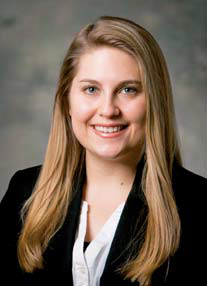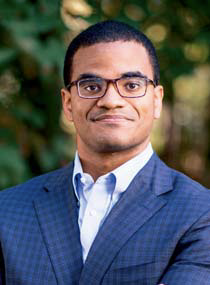Community Enterprise Clinic handles legal details of Durham shopping center transformation

A forlorn, largely vacant shopping center on 10 acres of asphalt in central Durham seems like an unlikely place for innovation. But Ann Woodward, executive director of the nonprofit Scrap Exchange, imagines transforming this site into a creative reuse arts district (the “RAD”). This district, an inventive mix of nonprofits, cooperatives, and for-profit companies, would not only ensure that the Lakewood Shopping Center becomes a profitable asset, but would also be the catalyst for the revitalization of the surrounding neighborhood.
Under the guidance of Clinical Professor Andrew Foster, who directs the Community Enterprise Clinic, Duke Law students have helped manage this complicated legal project over the past year. Collectively, the clinic’s student-attorneys have taken the lead on corporate planning, due diligence, and structuring and closing the financial transaction through which the Scrap Exchange was able to buy the shopping center. Through all of this, the clinic’s work helped the Scrap Exchange complete the first phase — property acquisition — of what is likely to be a lengthy and complex process.
“Our partnership has been invaluable,” said Woodward. “I am so impressed with [the students’] attention to detail. It would not have happened without them.”

The Community Enterprise Clinic focuses on projects that can benefit low-income communities. A beloved Durham institution for 25 years, the Scrap Exchange promotes creativity and environmental awareness through reuse and upcycling of materials: Test tubes, vintage postcards, books, magazines, fabric, wood, even old negatives, get a second life in classrooms, as art projects, and in myriad other ways.
Over consecutive semesters, Foster has mentored third-year law students Alyse Young ’16 and Geoffrey Wright ’17 as they took on greater and more challenging responsibilities through their representation of the Scrap Exchange on the Lakewood transformation. “Alyse last spring and now Geoff this fall have been willing to push themselves way beyond their comfort zones,” Foster said. “In complex matters like this, particularly where the client is looking for help on business and community concerns, as well as on legal issues, there are disorienting moments. But in the process of figuring it out — that’s when so much of the learning happens.”
Young played a particularly key role in the success of the first phase of the creation of the RAD. Among other things, she helped structure and negotiate a $2.5 million six-month bridge loan from a local community development lender. This loan enabled the Scrap Exchange, through its development subsidiary, to secure the financing needed to buy the shopping center. She also managed the tax details and timeline of the project. “It was fascinating,” said Young, now an associate at Womble Carlyle in Winston-Salem. “I’ve been interested in nonprofits for philosophical reasons, but the structuring of the transaction and the tax implications were very interesting. It was a great fit for me.”

The project involved multiple deadlines, and missing any of them could have threatened the completion. “We were trying to get $2.5 million without a lot of resources,” Woodward said. “Alyse created a timeline and kept people on task. It took a lot of heavy lifting to make the deal happen. It was one of the most intense work experiences I’ve had in my 13 years of being here.”
“There were moments I didn’t know if the deal was going to come together,” Young said. “We’d get over a hurdle and then another would arise. I learned so much. It’s the best law school experience I had.”
Through the fall semester, Wright led the clinic’s continuing work in helping to provide the project management needed to keep the next phases of the RAD creation on track. In addition to working with the Scrap Exchange to develop and manage a new timeline for the second phase of the project — renovating and leasing units in the shopping center — he advised Woodward on getting permanent financing for the RAD and on raising equity for the project from socially-motivated investors.
He said interacting with the client was particularly rewarding, as was “the hands-on experience of managing communication, especially translating the legal research into practical materials that they can use to push things forward. Through this I’ve been able to both learn and contribute.”
The RAD currently has three tenants: Makin’ Choices, a social enterprise that provides mental health services; El Centro Hispano, a nonprofit that helps the Latino community; and the Durham Economic Resource Center, a nonprofit work-force development program. When completed, it will include a shipping container mall, a black-box theater, an architectural salvage, artists’ studios, affordable housing, an outdoor stage, a playground, and a skateboard park.
— Lisa Sorg
